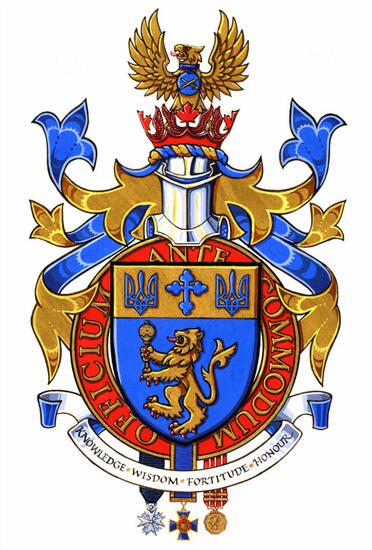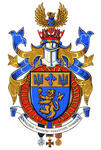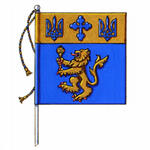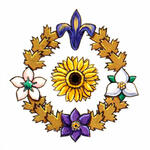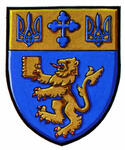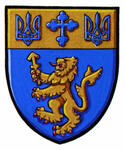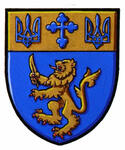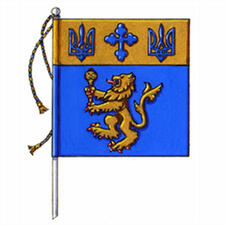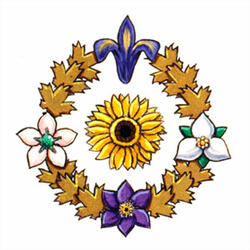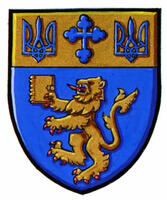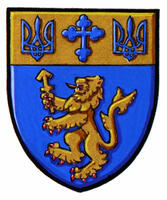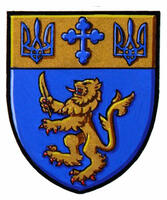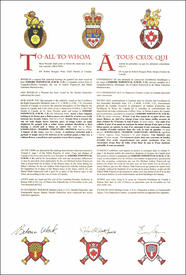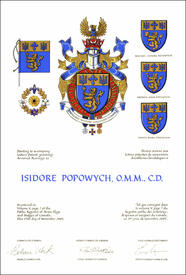The contents of this Register are intended for research purposes only. The heraldic emblems found in the Register may not be reproduced in any form or in any media without the written consent of the Canadian Heraldic Authority and/or the recipient.
Ottawa, Ontario
Grant of Arms, Flag and Badge, with differences to Michael Isidore Popowych, Andrew John Popowych and Daniel Mark Popowych
November 15, 2005
Vol. V, p. 7
Arms of Isidore PopowychBlazonAzure a lion rampant holding in its dexter paw a Bulava mace, on a chief Or a Latin cross treflé between two tryzubs Azure; SymbolismThe arms relate to national and family heritage. The shield is divided in the Ukrainian colours of blue and gold, representing the sky and the wheat of Ukraine. With a mysterious origin 2500 years ago, the trident (tryzub) is the thousand-year old national symbol of Ukraine and is drawn from the coat of arms of Volodymyr the Great (979-1015), the Grand Prince of Kiev. The trident was probably a mark of authority and a mystic symbol of the Scythians, one of the first known tribes of Ancient Ukraine. The two blue tridents honour the country from which the parents of both Isidore Popowych and his wife Dania Anne Krisa came to Canada. The cross treflé, with the triple clover petals on each arm, illustrates the Holy Trinity and is a popular symbol of Christianity in Western Ukraine, his ancestral homeland. The cross also alludes to the meaning of his name “Popowych” which is “Son of the Priest”, his faith, and the arms of his birthplace Tempelhof, in Berlin, Germany. The gold lion symbolises the medieval Principality of Galicia and the current Province of Lviv in Western Ukraine, the areas of origin of his forefathers, and it represents valour and the power to defend one’s homeland against invaders. The Bulava is the Cossack mace and is a symbol of the authority of the Hetman, the Commander-in-Chief of the Cossacks. Here, it alludes to the ceremonial bulava presented to Isidore Popowych, Brigadier-General, by the Chief of the General Staff of the Ukrainian Armed Forces for his services as a Canadian military advisor. It also alludes to the Popowych Regiment in the Order of Battle of the Zaporizhian Cossacks in the 17th century. |
CrestBlazonIssuant from a coronet the rim set with maple leaves between pairs of wings Gules an eagle displayed Or gorged with a collar Azure pendent therefrom a hurt bearing a sword and a baton in saltire Or; SymbolismThe Canadian version of the astral coronet represents the service of Isidore Popowych in the Royal Canadian Air Force and the Canadian Armed Forces, from which he retired as a Brigadier-General. The eagle of the air force is charged with a collar and the symbol alluding to the rank of a General Officer, the baton of marshalship surmounting the sword. As well, he has long admired the eagle for the qualities it symbolizes: freedom, strength, courage, loyalty and grace. |
MottoBlazonKNOWLEDGE • WISDOM • FORTITUDE • HONOUR; SymbolismThis motto lists qualities by which BGen Popowych believes one achieves much. |
Badge of Isidore PopowychBlazonA sunflower encircled with a garland of maple leaves Or between at its cardinal points a blue iris, a trillium flower, a mayflower and a prairie crocus flower proper; SymbolismThe badge is a garland of floral emblems in their natural colours symbolizing the Ukrainian family roots and the first Canadian-born generation of his family. The sunflower is the national flower of Ukraine, while the maple leaves are for Canada. The Quebec wild iris, the Ontario trillium, the Nova Scotia mayflower, and the Manitoba prairie crocus represent the birth provinces respectively of his wife Dania and sons Michael, Andrew and Daniel. |
Differenced Arms for Michael Isidore Popowych, son of Isidore PopowychBlazonThe Arms of Isidore Popowych with a closed book Or in place of the Bulava mace; this individual will inherit the Arms of the Recipient following his or her death; SymbolismMichael Isidore Popowych has a gold closed book as a difference, alluding to his educational interests. |
Differenced Arms for Andrew John Popowych, son of Isidore PopowychBlazonThe Arms of Isidore Popowych with the zodiacal glyph for Sagittarius Or in place of the Bulava mace; SymbolismAndrew John Popowych has a gold arrow for the Zodiacal symbol of Sagittarius as a difference alluding to the month of his birth. |
Additional InformationCreator(s)Original concept of Isidore Popowych, assisted by the Reverend Peter Galadza, Darrel Kennedy, Assiniboine Herald, and the Heralds of the Canadian Heraldic Authority PainterRobert Grey CalligrapherNancy Ellis Recipient TypeIndividual |

